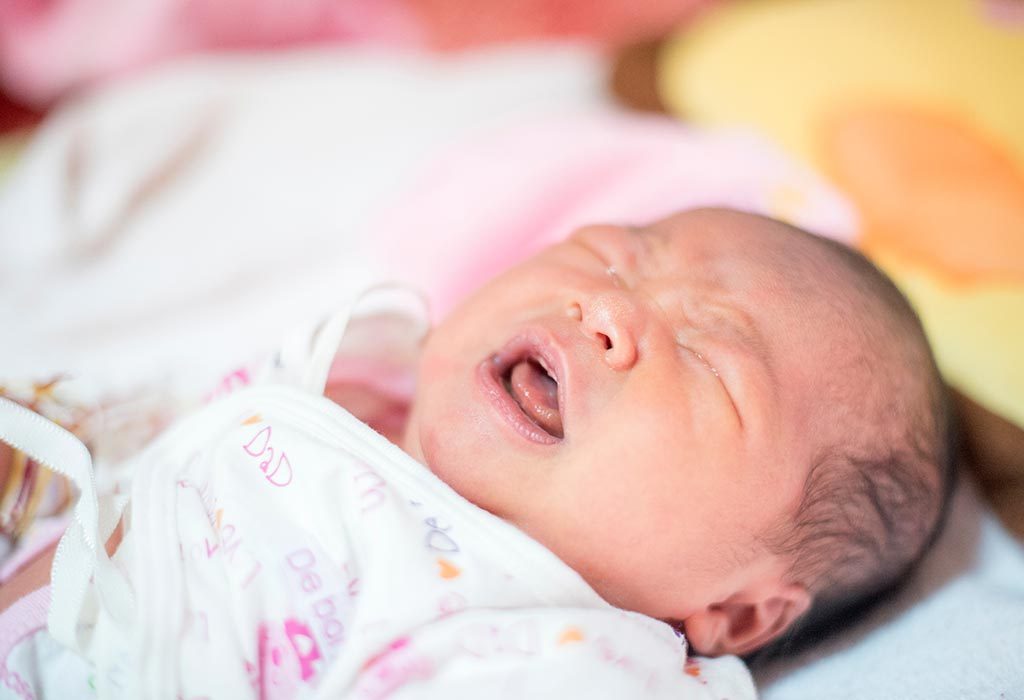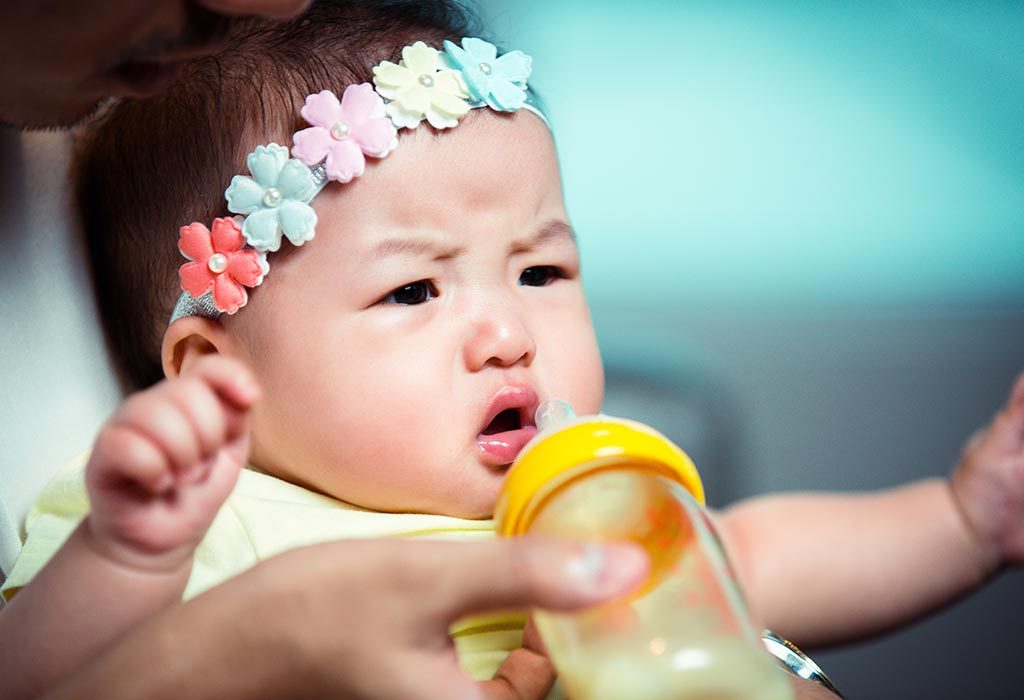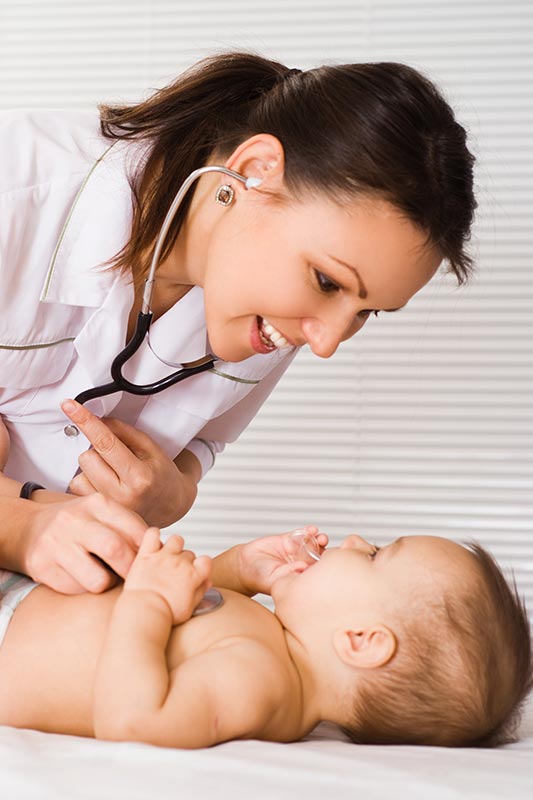2 Week Old Baby Crying After Feed
In this Article
- Video: Baby Crying after Feeding – Reasons and Ways to Stop
- Why Do Babies Cry After Feeding?
- Ways to Stop Your Baby From Crying After Feeding
- When to See a Doctor
Babies cry when they're hungry, it's a common experience for all parents. It is alarming, however, when babies cry after feeding, especially if they seem distressed and cry endlessly without wanting to settle down. Since this issue is frustrating to both the mother and the baby, understanding what causes their fussiness after feeding is imperative so a remedy can be found.
Video: Baby Crying after Feeding – Reasons and Ways to Stop
Why Do Babies Cry After Feeding?
Learning all the reasons why babies cry after feeding is the only way to try and work out why your little one cries after a feed. Here are five common reasons why babies cry after a meal:

1. Colic
If your baby seems gassy after feeding and cries for hours on end, it could be colic. Generally colic is the name for the condition where babies under 3 months, cry for at least 2-3 hours every day and cry for three or more days in the week. Although it's distressing to see your baby cry for extended periods whether you bottle feed or breastfeed him, it's quite a common condition. About 1 in 5 babies have colic, and there is no single reason why it seems to occur. It is thought that it could be because of the developing digestive system that they would get gas or are unable to digest the milk fully.
Babies might have colic if they cry intensely for no apparent reason with their fists clenched and cheeks red. They would also arch their back and pull their knees close to the tummy. When they are not crying, they are their normal and happy self.
2. Acid Reflux
Acid reflux is a problem where the underdeveloped sphincter muscles at the end of their food pipe are unable to hold the contents of the stomach. This causes food along with digestive juices to flow out of the stomach and into the food pipe. Babies may or may not spit up the juices that flow into their food pipe. Therefore, spitting up is not always caused by acid reflux. The medical term for the condition is Gastroesophageal Reflux Disease (GERD). In older children and adults, GERD gives rise to symptoms such as stomach and heartburn. Acid reflux is one of the common symptoms of GERD. It can also manifest symptoms similar to colic.
Diagnosis of reflux is made based on the baby's symptoms and if severe cases are suspected, the doctor would recommend different tests to diagnose the problem.
3. Food Allergies
Babies are often sensitive to new foods and can quickly develop allergies as their immune systems treat them as a threat. This is more common in breastfed babies, as mothers eat a variety of foods the babies are not used to yet. Of the most-fed baby foods that cause allergies, milk, eggs and soy contribute to the highest number of allergies in children. If babies display symptoms such as extreme irritability, redness, hives or bloody stools after feeding, it is advisable to contact the doctor to test for allergies.
4. Gas
Gas is also a common cause of discomfort for babies soon after eating. If they seem to cry a lot of after every feed and show symptoms of bloating, it could be that they swallowed a lot of air while feeding. When you notice your baby crying after feeding formula from a bottle, he may have swallowed a lot of air while feeding, causing all that gas to get trapped in the stomach making him uncomfortable. Although this is more common in bottle-fed babies, breastfed babies also experience this problem and need to be burped often during feeds.
5. Formula
If you notice your baby crying after eating formula of a certain brand or manufacturer, he could be sensitive to the ingredients present in them. Since every formula has a bit of different composition, the stomachs of babies might take well to some and reject others. In such cases, it's advisable to try specific formulas made for sensitive babies. Talk to the doctor before experimenting with different brands of formula.
Ways to Stop Your Baby From Crying After Feeding
Figuring out what is making your baby cry is only half the solution. Now you need to figure out how to stop the condition that leads to it.

1. Dealing With Colic
Try and eliminate as many factors as you can to deal with the baby's colic. As they continue crying, babies suck in more air and increase their own discomfort and establish a self-reinforcing loop. If there are other symptoms you notice, have a doctor rule them out as possibilities. Colic resolves itself around 6 weeks and is usually completely gone by 4 months. For now, there is no treatment for colic except to eliminate all possible triggers.
2. Remedies for Acid Reflux
To stop food flowing back into the oesophagus, sit your baby upright during their feeds. Laying them down while feeding or after feeds applies pressure on the oesophagal sphincter causing it to open. Hold the baby upright on your shoulder for at least 30 minutes after feeding. This way, the food stays in the stomach and he can burp out the gases.
3. Remedies for Gas
To deal with gas, sit the baby upright or have him rest on your shoulder for at least 30 minutes after feeding. Burp him often during feeds and after feeds to release trapped gases mixed with the food. Hold babies upright and gently pat their backs to bring the gas up. If patting their back doesn't work, try gently rubbing their lower backs and tummies in a circular motion to loosen the path of trapped gases. If the baby cries after feeding, he has probably ingested a lot of air and feels hungry when burped.
4. Dealing With Food issues
If your baby is crying after eating oatmeal cereal or there are other foods that you know the baby is allergic to, avoid such foods and choose alternatives that he can handle well. Consider switching the formula if he is sensitive to certain brands and becomes colicky after eating. When breastfeeding, avoid foods that can cause him discomfort.
When to See a Doctor

Colic and a few other conditions are to blame if babies cry too much after feeding. However, when you have tried all remedies such as changing formulas (if you are formula-feeding) or have avoided known allergens in your diet (if you are breastfeeding) and your baby continues to cry or vomit while losing weight, it's time to consult a doctor.
Seeing your baby cry after feeding can be distressing, as you try to understand what is causing the discomfort. A systematic approach to testing what kind of foods and feeding habits cause discomfort to your baby will help you narrow down the problem and find ways to eliminate them.
Also Read :
Why Baby Cries during Bath
Why Does Baby Cry in Sleep
Why Does Baby Cry Before Sleep
swearingensabst1957.blogspot.com
Source: https://parenting.firstcry.com/articles/baby-crying-after-feeding-reasons-and-ways-to-stop/
Post a Comment for "2 Week Old Baby Crying After Feed"